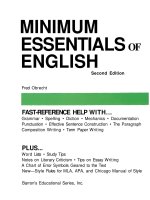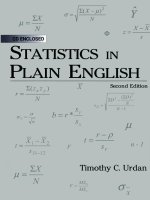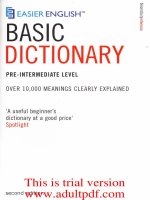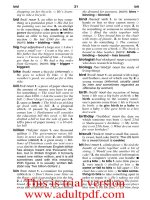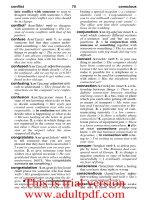practice makes perfect basic english second edition beginner 250 exercises 40 audio pronunciation exercises practice makes perfect series
Bạn đang xem bản rút gọn của tài liệu. Xem và tải ngay bản đầy đủ của tài liệu tại đây (1.69 MB, 287 trang )
Basic English
PREMIUM SECOND EDITION
Julie Lachance
This book is dedicated to my students because they have taught
and given me so much over the years.
Copyright © 2015 by Julie Lachance. All rights reserved. Except as permitted under the United States Copyright Act of 1976, no part of this publication may be
reproduced or distributed in any form or by any means, or stored in a database or retrieval system, without the prior written permission of the publisher, with the
exception that the program listings may be entered, stored, and executed in a computer system, but they may not be reproduced for publication.
ISBN: 978-0-07-184963-0
MHID: 0-07-184963-7
The material in this eBook also appears in the print version of this title: ISBN: 978-0-07-184962-3,
MHID: 0-07-184962-9.
eBook conversion by codeMantra
Version 1.0
All trademarks are trademarks of their respective owners. Rather than put a trademark symbol after every occurrence of a trademarked name, we use names in an
editorial fashion only, and to the beneit of the trademark owner, with no intention of infringement of the trademark. Where such designations appear in this book,
they have been printed with initial caps.
McGraw-Hill Education eBooks are available at special quantity discounts to use as premiums and sales promotions or for use in corporate training programs. To
contact a representative, please visit the Contact Us page at www.mhprofessional.com.
Language App
Audio recordings that supplement this book can be found in the McGraw-Hill Education Language Lab app.
The recordings provide model sentences to practice sounds that learners of English commonly have dificulty in mastering. Go to mhlanguagelab.com for details
on how to access this free app, which is available for Apple and Android tablet and mobile devices, as well as for computer via web browser.
TERMS OF USE
This is a copyrighted work and McGraw-Hill Education and its licensors reserve all rights in and to the work. Use of this work is subject to these terms. Except
as permitted under the Copyright Act of 1976 and the right to store and retrieve one copy of the work, you may not decompile, disassemble, reverse engineer,
reproduce, modify, create derivative works based upon, transmit, distribute, disseminate, sell, publish or sublicense the work or any part of it without McGraw-Hill
Education’s prior consent. You may use the work for your own noncommercial and personal use; any other use of the work is strictly prohibited. Your right to use
the work may be terminated if you fail to comply with these terms.
THE WORK IS PROVIDED “AS IS.” McGRAW-HILL EDUCATION AND ITS LICENSORS MAKE NO GUARANTEES OR WARRANTIES AS TO THE
ACCURACY, ADEQUACY OR COMPLETENESS OF OR RESULTS TO BE OBTAINED FROM USING THE WORK, INCLUDING ANY INFORMATION
THAT CAN BE ACCESSED THROUGH THE WORK VIA HYPERLINK OR OTHERWISE, AND EXPRESSLY DISCLAIM ANY WARRANTY, EXPRESS
OR IMPLIED, INCLUDING BUT NOT LIMITED TO IMPLIED WARRANTIES OF MERCHANTABILITY OR FITNESS FOR A PARTICULAR PURPOSE.
McGraw-Hill Education and its licensors do not warrant or guarantee that the functions contained in the work will meet your requirements or that its operation will
be uninterrupted or error free. Neither McGraw-Hill Education nor its licensors shall be liable to you or anyone else for any inaccuracy, error or omission, regardless
of cause, in the work or for any damages resulting therefrom. McGraw-Hill Education has no responsibility for the content of any information accessed through
the work. Under no circumstances shall McGraw-Hill Education and/or its licensors be liable for any indirect, incidental, special, punitive, consequential or similar
damages that result from the use of or inability to use the work, even if any of them has been advised of the possibility of such damages. This limitation of liability
shall apply to any claim or cause whatsoever whether such claim or cause arises in contract, tort or otherwise.
Contents
Introduction vii
1 To Be: Present Tense
1
2 To Be: Present Tense: Negative Form
5
3 To Be: Present Tense: Question Form
9
4 To Be: Past Tense
13
5 To Be: Past Tense: Negative Form
17
6 To Be: Past Tense: Question Form
21
7 Exceptional Uses with the Verb To Be
8 Adjectives
25
29
9 To Have: Present Tense
33
10 To Have: Present Tense: Negative Form
37
11 To Have: Present Tense: Question Form
41
12 The Simple Present Tense
45
13 The Simple Present Tense: Negative Form
49
14 The Simple Present Tense: Question Form
53
15 Possessive Adjectives
57
iii
16 The Simple Past Tense
61
17 The Simple Past Tense with Irregular Verbs: 1
65
18 The Simple Past Tense with Irregular Verbs: 2
69
19 The Simple Past Tense with Irregular Verbs: 3
73
20 The Simple Past Tense: Negative Form
77
21 The Simple Past Tense: Question Form
81
22 Prepositions: In and On
85
23 There Is and There Are: Present Tense
89
24 There Is and There Are: Present Tense: Negative Form
93
25 There Is and There Are: Present Tense: Question Form
97
26 There Is and There Are: Past Tense
101
27 There Is and There Are: Past Tense: Negative Form
106
28 There Is and There Are: Past Tense: Question Form
110
29 Prepositions: To and At
114
30 The Present Progressive (Continuous) Tense
31 The Present Progressive (Continuous) Tense:
Negative Form 122
32 The Present Progressive (Continuous) Tense:
Question Form 126
33 The Past Progressive (Continuous) Tense
34 The Past Progressive (Continuous) Tense:
Negative Form 134
35 The Past Progressive (Continuous) Tense:
Question Form 138
36 Prepositions: From and Of
iv
Contents
142
130
118
37 Will: Future Tense
146
38 Will: Future Tense: Negative Form
150
39 Will: Future Tense: Question Form
154
40 Be Going To: Future Tense
158
41 Be Going To: Future Tense: Negative Form
162
42 Be Going To: Future Tense: Question Form
166
43 The Indeinite Articles: A and An
44 Irregular Verbs Table
170
174
45 The Present Perfect Tense
178
46 The Present Perfect Tense: Negative Form
182
47 The Present Perfect Tense: Question Form
186
48 The Past Perfect Tense
190
49 The Past Perfect Tense: Negative Form
194
50 The Past Perfect Tense: Question Form
198
51 The Future Perfect Tense
202
52 The Future Perfect Tense: Negative Form
206
53 The Future Perfect Tense: Question Form
210
REVIEW EXERCISES
54 Verb Tenses Review: 1
217
55 Verb Tenses Review: 2
221
56 Verb Tenses Review: 3
225
57 Verb Tenses Review: 4
229
Contents
v
58 Verb Tenses Practice: 1
233
59 Verb Tenses Practice: 2
238
60 Regular and Irregular Verbs Review
61 Grammar Review
245
62 Vocabulary Review
63 Word Search Puzzles
254
64 Scrambled Sentences
258
Answer Key 261
vi
251
Contents
242
Introduction
Congratulations on choosing Practice Makes Perfect: Basic English for your irst
year of English language learning.
here is really only one way to learn a new language, and that is to build your
vocabulary, learn the verb tenses and the mechanics of that language, and then
practice, practice, practice. his workbook was designed to help you do just that.
his workbook will help you to proiciently learn and efectively master the
strategies and methods needed to provide you with a solid foundation in English.
All the lessons are presented in a simple and progressive format designed to help
you retain the knowledge and gain conidence by applying and reinforcing the
skills acquired throughout the workbook.
You will learn the mechanics of English through user-friendly, interactive,
and well-constructed grammar exercises. hese exercises are loaded with everyday
basic words intended to help you quickly and eiciently enrich your vocabulary
and give you a irm understanding of the lesson before moving on to the next.
Ample space is provided in each lesson for you to record your new vocabulary words in a central location to allow you to study these words regularly and
refer back to them quickly when necessary. Be sure to learn these words by heart
as they are basic and useful English words.
he second section of this new edition of Practice Makes Perfect: Basic English
provides you with a variety of review exercises specially designed to allow you to
measure your comprehension and retention of the concepts covered in the lessons
of this workbook. Since these review exercises are directly related to the learning
objectives of this workbook, they will allow you to recognize your achievements
and highlight your progress. hey will also provide you with the opportunity to
strengthen your abilities by serving as extra practice for the material previously
studied. To assure a fair and accurate self-evaluation of your progress, be sure to
complete the entire workbook before attempting these review exercises.
Learning a new language is an interesting and exciting journey that is
enhanced when the learning material is presented in a stimulating and enjoyable
manner that encourages a learner to keep moving forward.
We wish you much success and enjoyment throughout your learning process using this workbook, and we are conident that you will gain from it exactly
what was intended: a solid comprehension of your irst year of English language
learning.
Good luck, and above all, have fun.
vii
·1·
To Be: Present Tense
he verb to be describes the identity, qualities, or condition of a person or object.
Use the following to form the present tense of the verb to be.
I am
you are
he is
she is
it is
we are
they are
→
→
→
→
→
→
→
I am happy today.
You are smart.
He is my friend.
She is busy.
It is true.
We are tired.
hey are here.
EXERCISE
1·1
Use your dictionary to ind the meaning of the new vocabulary words
needed for this exercise before you begin. Write the words in your
language in the space provided.
lashlight
happy
kitchen
sick
girl
lower
vacuum
tent
counter
toy
basement
ribbon
closet
dirty
today
pink
nice
pretty
smart
yellow
microwave oven
here
busy
ready
small
fridge
loor
hair
tired
twins
true
friend
1
Rewrite the following sentences to create the present tense by choosing the correct form of the verb to be
in parentheses.
1. The girl (am, is, are) pretty.
2. I (am, is, are) ready.
3. She (am, is, are) my friend.
4. They (am, is, are) twins.
5. The lowers (am, is, are) yellow.
6. The lashlight (am, is, are) in the tent.
7. The fridge and counter in the kitchen (am, is, are) dirty.
8. I (am, is, are) tired today.
9. We (am, is, are) busy.
10. The toys (am, is, are) in the basement.
11. The ribbons in my hair (am, is, are) pink.
12. The kitchen (am, is, are) very small.
13. The vacuum (am, is, are) in the closet.
14. He (am, is, are) nice.
15. The microwave oven (am, is, are) in the kitchen.
2
practice makes perfect Basic English
16. The toy (am, is, are) on the loor.
17. I (am, is, are) sick today.
EXERCISE
1·2
Use your dictionary to ind the meaning of the new vocabulary words needed for this
exercise before you begin. Write the words in your language in the space provided.
aunt
cousin
cloud
uncle
red
bright
window
blue
cold
brother
teacher
class
man
tall
news
hot
furniture
upstairs
moon
green
bug
woman
bald
student
open
juice
sad
lawyer
room
grass
old
lazy
Complete the following sentences using the correct form of the verb to be.
1. My aunt
nice.
2. The clouds
3. Kathy
white.
sick.
4. The ribbons
5. We
6. The windows
7. Colton and Cody
yellow.
twins.
open.
brothers.
To Be: Present Tense
3
8. We
teachers.
9. It
a French book.
10. You
very smart.
11. It
sad news.
12. She
my cousin.
13. You
tired.
14. The grass
15. It
green.
in my room.
16. They
lazy.
17. The lower
yellow.
18. The bug
19. I
20. The man
on the counter.
tall.
happy.
21. The vacuum
red.
22. The tent
blue.
23. The juice
cold.
24. She
25. They
a student.
in my class.
26. The woman
27. She
a lawyer.
upstairs.
28. The teacher
smart.
29. The ribbon
blue.
30. The water
hot.
31. My uncle
bald.
32. The furniture
4
old.
33. The fridge
in the kitchen.
34. The moon
bright.
practice makes perfect Basic English
To Be: Present Tense:
Negative Form
·2·
Place not ater the verb to be to create the negative form of the present tense.
I am
you are
he is
she is
it is
we are
they are
→
→
→
→
→
→
→
I am not
you are not
he is not
she is not
it is not
we are not
they are not
→
→
→
→
→
→
→
I am not ready.
You are not busy.
He is not my friend.
She is not tall.
It is not true.
We are not tired.
hey are not pink.
he negative form of the present tense of the verb to be can also be expressed
with the contraction isn’t or aren’t. here is no contraction for am not.
I am not
you are not
he is not
she is not
it is not
we are not
they are not
→
→
→
→
→
→
→
I am not
you aren’t
he isn’t
she isn’t
it isn’t
we aren’t
they aren’t
→
→
→
→
→
→
→
I am not sick.
You aren’t a teacher.
He isn’t a lawyer.
She isn’t ready.
It isn’t a toy.
We aren’t twins.
hey aren’t yellow.
EXERCISE
2·1
Use your dictionary to ind the meaning of the new vocabulary words
needed for this exercise before you begin. Write the words in your
language in the space provided.
table
neighbor
city
cheese
kid
Italian
sister
early
bus
Spanish
sister-in-law
drawer
sour
empty
lime
pregnant
5
Rewrite the following sentences to express the negative form. Write the sentence once using am not, is not,
or are not and once using the contraction isn’t or aren’t.
1. The cheese is on the table.
2. She is my sister.
3. My neighbors are Spanish.
4. My sister-in-law is Italian.
5. Diane is pregnant.
6. The limes are sour.
7. The bus is empty.
8. The kids are early for class today.
9. The drawers are empty.
10. It is a nice city.
6
practice makes perfect Basic English
EXERCISE
2·2
Use your dictionary to ind the meaning of the new vocabulary words needed for this
exercise before you begin. Write the words in your language in the space provided.
boss
wife
mall
boy
far
dragonly
subway
full
road
white
eraser
bowl
fair
black
wide
hand
husband
pen
good
expensive
idea
late
store
car
key
garbage can
oice
garbage bag
work
shelf
book
pencil case
school
shoe
ceiling
doctor
Use am not or the contraction isn’t or aren’t to complete the following negative sentences.
1. The subway
full.
2. The windows
3. It
4. The keys
dirty.
a dragonly.
in the car.
5. The microwave oven
in the kitchen.
6. My boss
at the oice.
7. The boys
in the tent.
8. We
9. My hands
10. The eraser
11. She
busy at work.
dirty.
in the pencil case.
a teacher in my school.
To Be: Present Tense: Negative Form
7
12. The ceiling
white.
13. The bowls
on the table.
14. The garbage bags
in the drawer.
15. The garbage can
full.
16. The store
17. It
far.
fair.
18. The roads in the city
wide.
19. My husband
a doctor.
20. The pens
black.
21. The books
on the shelf.
22. The vacuum
23. They
in the basement.
friends.
24. The ribbon
25. She
red.
late for class today.
26. It
true.
27. I
tired.
28. Barry
a good student.
29. The juice
cold.
30. My wife
at the mall.
31. The shoes
expensive.
32. The students
tired today
33. The woman
34. It
8
old.
a good idea.
practice makes perfect Basic English
To Be: Present Tense:
Question Form
·3·
Place the verb to be before the subject to create the question form of the present
tense.
I am
you are
he is
she is
it is
we are
they are
→
→
→
→
→
→
→
am I
are you
is he
is she
is it
are we
are they
→
→
→
→
→
→
→
Am I late?
Are you my new boss?
Is he your teacher?
Is she your neighbor?
Is it expensive?
Are we early?
Are they in the basement?
EXERCISE
3·1
Use your dictionary to ind the meaning of the new vocabulary words
needed for this exercise before you begin. Write the words in your
language in the space provided.
wheel
pond
policeman
bathroom
goldish
outside
sweet
toothbrush
meeting
toothpaste
serious
bathing suit
English
desk
orange
coat
sharpener
cow
clothesline
box
garage
calf
French
frog
brown
poor
downstairs
very
9
Rewrite the following sentences to create questions by placing the verb to be before the subject.
Don’t forget to include a question mark (?) in your answer.
1. The wheels are in the garage.
2. The sharpener is on my desk.
3. The toothbrush and toothpaste are in the bathroom.
4. My bathing suit is on the clothesline.
5. I am in your English class.
6. It is cold outside.
7. He is a policeman in the city.
8. The coats are on the loor.
9. Johanne and Véronique are in a meeting.
10. The toys are in the box downstairs.
11. The cow and calf are brown.
12. The orange juice is sweet.
13. The frogs are in the pond.
14. The goldish is in the bowl.
15. You are serious.
16. Marie is French.
10
practice makes perfect Basic English
EXERCISE
3·2
Use your dictionary to ind the meaning of the new vocabulary words needed for this
exercise before you begin. Write the words in your language in the space provided.
knife
gate
dishwasher
printer
fork
nail polish
bill
bird
correct
skunk
living room
pillow
clean
accountant
real
ink
sharp
fence
lipstick
thread
oven
curtain
bed
pen
funny
Mrs.
pearl
pot
sheet
birdhouse
turkey
pan
Chinese
pig
Mr.
garden
Scottish
again
needle
there
Complete the following questions using the correct form of the verb to be.
1.
it cold in Canada?
2.
the skunks in my garden again?
3.
the needle and thread in the drawer?
4.
he a good accountant?
5.
they in the living room?
6.
the ink in the printer?
7.
the pots and pans clean?
8.
she your sister-in-law?
9.
the forks in the dishwasher?
To Be: Present Tense: Question Form
11
12
10.
we ready?
11.
it a black pen?
12.
I nice?
13.
you busy today?
14.
the gate open?
15.
the fridge empty?
16.
Mr. and Mrs. Yee Chinese?
17.
the pillows on the bed?
18.
the fence white?
19.
the books on the shelf?
20.
the sheets on the clothesline?
21.
the curtains blue?
22.
the nail polish purple?
23.
the pearls real?
24.
Mrs. McMahon Scottish?
25.
the turkey in the oven?
26.
the birds in the birdhouse?
27.
the pigs in the pen?
28.
the knife sharp?
29.
the bill correct?
30.
the lipstick red or pink?
31.
they there?
32.
I funny?
practice makes perfect Basic English
·4 ·
To Be: Past Tense
he past tense of the verb to be is created by using was or were in place of am, is,
and are.
I am
you are
he is
she is
it is
we are
they are
→
→
→
→
→
→
→
I was
you were
he was
she was
it was
we were
they were
→
→
→
→
→
→
→
I was tired at school today.
You were downstairs.
He was funny.
She was at work.
It was on the shelf.
We were upstairs.
hey were here.
EXERCISE
4 ·1
Use your dictionary to ind the meaning of the new vocabulary words
needed for this exercise before you begin. Write the words in your
language in the space provided.
snake
farm
diaper
minnow
sorry
crust
beach
grandmother
pencil
hairdresser
bag
exam
roommate
thick
laundry room
pool
bucket
washer
dryer
13
Rewrite the following sentences to create the past tense by changing the present tense form of the verb
to be to the past tense form.
1. He is my roommate.
2. It is in my pocket.
3. The snake is in the garden.
4. The diapers are in the bag.
5. Lisa is sick.
6. The kids are in the pool.
7. The bucket is full of minnows.
8. The washer and dryer are in the laundry room.
9. I am in my oice.
10. The pencil is on the loor.
11. Sorry that I am late.
12. The lowers are for Jennifer.
13. My grandmother is in the hospital.
14. The exam is easy.
15. The crust is very thick.
16. The farm is very far.
14
practice makes perfect Basic English
EXERCISE
4 ·2
Use your dictionary to ind the meaning of the new vocabulary words needed for this
exercise before you begin. Write the words in your language in the space provided.
huge
cupboard
ring
asleep
crib
skating rink
story
slipper
fresh
wedding
soft
egg
spicy
shower
baby
awake
with
vase
wine
locker
cellar
soup
rake
whale
downtown
bedroom
broken
last night
godmother
couch
yesterday
both
candle
library
nurse
cafeteria
Complete the following past tense sentences using was or were.
1. The baby
in the crib.
2. The candles
3. It
4. They
on the table.
a good story.
awake.
5. My godmother
asleep on the couch.
6. The wine
7. I
8. He
9. The bowls
10. The girls
11. The moon
in the cellar.
ready.
in the shower.
in the cupboard.
at the skating rink.
bright last night.
To Be: Past Tense
15
12. The juice
fresh.
13. The eggs
on the counter.
14. My sister
outside.
15. The keys
in the car.
16. The ring
expensive.
17. You
18. The soup
at the wedding.
hot and spicy.
19. Both pillows
20. Annie
soft.
a nurse.
21. The lowers
22. The rake
in the vase.
in the garage.
23. My slippers
24. The whale
25. We
26. Chris
27. It
28. We
29. The pool
in the bedroom.
huge.
downtown yesterday.
in the cafeteria with Cory.
in my locker.
at the library.
small.
30. The printer
broken.
31. My pockets
full.
32. The teachers
16
practice makes perfect Basic English
in the oice.
To Be: Past Tense:
Negative Form
·5·
Place not ater the past tense form of the verb to be to create a negative sentence.
I was
you were
he was
she was
it was
we were
they were
→
→
→
→
→
→
→
I was not
you were not
he was not
she was not
it was not
we were not
they were not
→
→
→
→
→
→
→
I was not sick yesterday.
You were not at the beach.
He was not at the meeting.
She was not very nice.
It was not on my desk.
We were not late.
hey were not ready.
he negative form of the past tense of the verb to be can also be expressed
with the contraction wasn’t or weren’t.
I was not
you were not
he was not
she was not
it was not
we were not
they were not
→
→
→
→
→
→
→
I wasn’t
you weren’t
he wasn’t
she wasn’t
it wasn’t
we weren’t
they weren’t
→
→
→
→
→
→
→
I wasn’t tired last night.
You weren’t at work today.
He wasn’t serious.
She wasn’t here yesterday.
It wasn’t true.
We weren’t at the library.
hey weren’t busy last night.
EXERCISE
5·1
Use your dictionary to ind the meaning of the new vocabulary words
needed for this exercise before you begin. Write the words in your
language in the space provided.
dress
list
purple
year
tree
joke
raccoon
plate
waitress
play (n)
fast
name
17




